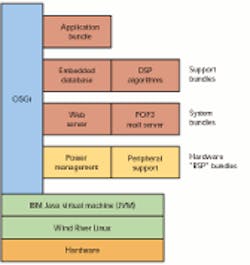Everyware is built on top of an OSGi stack
Building a system from the ground up including all the software can be rewarding, but it’s a timeconsuming process that’s prone to errors. That’s why developers utilize off-the-shelf processor boards, operating systems, and run-time systems. Systems that aren’t built with a significant amount of off-theshelf hardware and software are rare.
On the software side, C remains the dominant programming language of choice, with C++ bringing up the rear. C++ has made significant gains on the embedded side, so object-oriented programming isn’t a foreign methodology to embedded developers. But even with their popularity, C and C++ have some major challenges when it comes to creating bug-free code. Potential problems crop up with issues such as pointer errors and non-portable multithreaded applications, which are key with the growing plethora of multicore platforms.
Eurotech’s Everyware Software Framework (ESF) seeks to address many of these typical embedded development shortcomings (see the figure). ESF is based on Java and the OSGi framework, originally developed for Java applications running on a set-top box, although it can incorporate packages written in any programming language including C and C++. It’s available with many of Eurotech’s platforms, such as the company’s PC/104 boards, and it will eventually span its product line.
JAVA MYTHS AND LEGENDS
If you mention Java to many embedded programmers, the response is often jovial laughter or violent recrimination. They’ll repeat myths such as “Java can’t be fast and efficient,” “Java uses too much memory,” or “Java can’t do real-time applications,” so many programmaers might view Everyware with more than a bit of skepticism.
Everyware’s optimizing compilers, real-time pacing garbage collectors, and real-time Java implementations more than address these issues. In addition, Java has a number of features such as built-in multithreading, not to mention significant advantages when it comes to portability. So, it behooves C and C++ embedded developers to take a close look at platforms such as Everyware.
OSGi, ECLIPSE, AND LINUX
The Everyware Software Framework is based on Wind River Linux, IBM’s Java virtual machine (JVM), the OSGi framework (the basis for the Eclipse integrated development environment), and a host of general and hardware-specific “bundles.”
Bundles are Java packages. Each supported Eurotech board has its own hardware-specific bundle. This makes ESF more like a “super” board support package. The Java Native Interface (JNI) can be used to build bundles that incorporate C and C++ code or code developed using other languages as well.
ESF brings together a collection of software that has been readily available and in use for other application environments. The fact that ESF is a complete, integrated system that targets specific hardware will be a key to its success with embedded developers.
Arlen Nipper, Eurotech’s president and CTO, said that his company developed ESF because of the amount of time that customers spent developing pieces of OSGi technology in a custom fashion, such as bundle management and deployment. Likewise, they were spending a lot of time debugging code that had pointer errors. Java and OSGi address these issues.
Eurotech recognizes that ESF is not the only alternative. Developers can still buy Eurotech boards and use their regular tools and programming languages like C. However, the reasons to move to ESF are compelling.
About the Author
William G. Wong
Senior Content Director - Electronic Design and Microwaves & RF
I am Editor of Electronic Design focusing on embedded, software, and systems. As Senior Content Director, I also manage Microwaves & RF and I work with a great team of editors to provide engineers, programmers, developers and technical managers with interesting and useful articles and videos on a regular basis. Check out our free newsletters to see the latest content.
You can send press releases for new products for possible coverage on the website. I am also interested in receiving contributed articles for publishing on our website. Use our template and send to me along with a signed release form.
Check out my blog, AltEmbedded on Electronic Design, as well as his latest articles on this site that are listed below.
You can visit my social media via these links:
- AltEmbedded on Electronic Design
- Bill Wong on Facebook
- @AltEmbedded on Twitter
- Bill Wong on LinkedIn
I earned a Bachelor of Electrical Engineering at the Georgia Institute of Technology and a Masters in Computer Science from Rutgers University. I still do a bit of programming using everything from C and C++ to Rust and Ada/SPARK. I do a bit of PHP programming for Drupal websites. I have posted a few Drupal modules.
I still get a hand on software and electronic hardware. Some of this can be found on our Kit Close-Up video series. You can also see me on many of our TechXchange Talk videos. I am interested in a range of projects from robotics to artificial intelligence.

